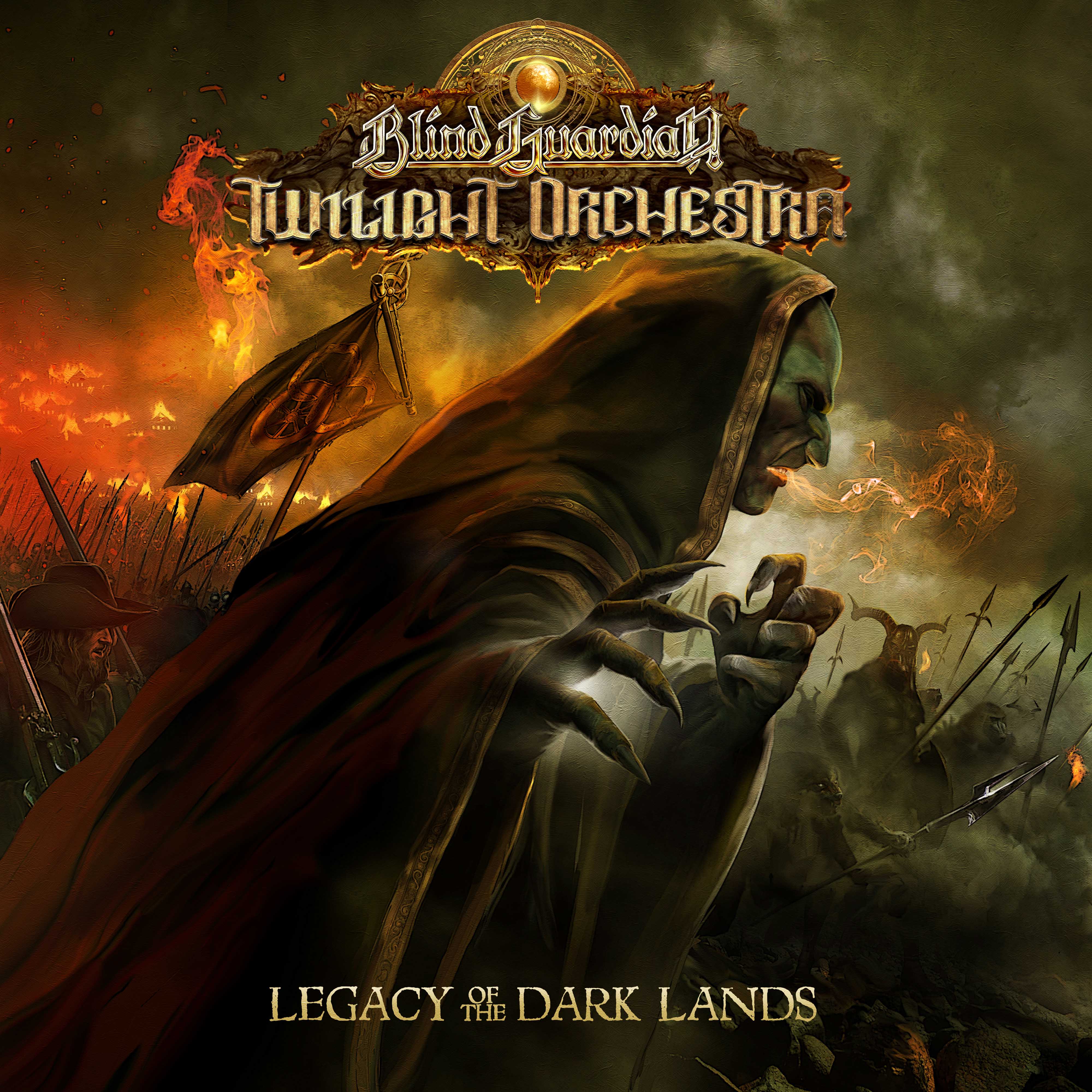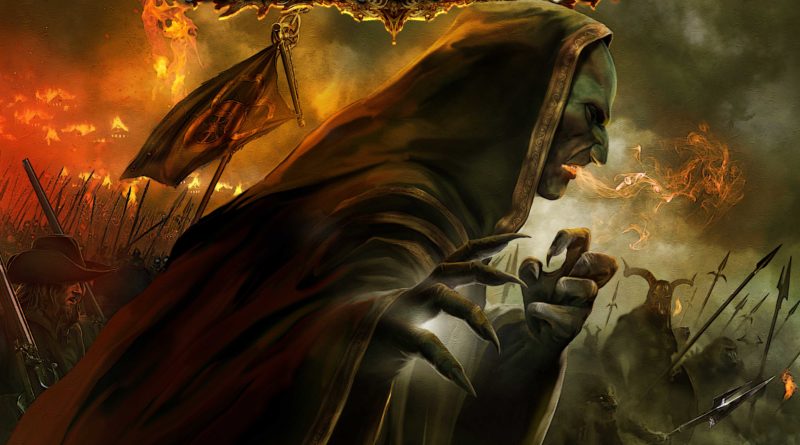ALBUM REVIEW: Legacy of the Dark Lands – Blind Guardian Twilight Orchestra
Undisputed kings of symphonic power metal BLIND GUARDIAN have been beavering away at a brand new project, and it is finally here for all to enjoy. But know this, true believers: the new project isn’t the same epic power metal band we know and love. It is, instead, the BLIND GUARDIAN TWILIGHT ORCHESTRA. It’s a whole new thing, and in collaboration with celebrated German fantasy author Markus Heitz, they have brought to light a fantasy tale of epic proportions in the form of Legacy of the Dark Lands.
The BLIND GUARDIAN TWILIGHT ORCHESTRA (BGTO) is the culmination of over twenty years of work by original founding members Hansi Kürsch and André Olbrich. And it shows. The entirely orchestral compositions are as vividly realised, and dramatically breathtaking as anything Beethoven could have conjured. In fact, given the scale of the album’s story, it feels almost like a creation of famed German opera composer Richard Wagner. Unlike Wagner’s creations, however, its 76-minute runtime never feels bloated. Not a moment feels wasted between the narrative interludes which propel the story and the operatic musical numbers. It’s arguably the quickest way of getting through a novel-length story without feeling like you’ve skipped scenes.
And yes, it is entirely orchestral. There are no electric guitars here. The more fair-weather fans may be put off by this, but they shouldn’t be. Olbrich and Kürsch have managed to pull the core BLIND GUARDIAN sound into entirely orchestral compositions thanks in no small part to having incorporated symphonic elements into their power metal albums almost since the beginning. Beyond The Red Mirror shows this off to the greatest degree, having incorporated two full-sized orchestras and three choirs into its majestic sweep. And the discerning ear can pick up motifs from the band’s entire discography peppered throughout Legacy of the Dark Lands. The most obvious example is on Harvester of Souls, which clocks in as the album’s longest song, and borrows heavily from At The Edge of Time from Beyond The Red Mirror. But elsewhere, for example, In The Red Dwarf’s Tower borrows little trills from The Edge off A Twist in the Myth. This has the pleasant effect of grounding the work of BLIND GUARDIAN TWILIGHT ORCHESTRA in the discography of BLIND GUARDIAN itself: BGTO is most definitely a separate project, but one that honours its roots. To really solidify this, they have impressively managed to recruit the same narrators as they got in for 1998’s Nightfall in Middle-Earth which feels like it brings things neatly fully circle.
Kürsch’s overdubbed voice, present throughout this album as it is on BLIND GUARDIAN’s entire discography, is bolstered by the phenomenal work of the Prague Filmharmonic Orchestra, which has provided vocals on albums by SEPTICFLESH, contributed to the soundtracks of games like Halo Wars and, more pertinently, worked with BLIND GUARDIAN on this reviewer’s favourite album At The Edge of Time. The use of orchestras is not unique to the band, of course, but an entirely orchestral album shows off just how delightful proper classical music performed by proper classical musicians can be. The dramatic climax of In The Underworld or the lush opening of Dark Cloud’s Rising serve as fantastic illustrations of this. The layers of harmony and melody are exquisitely managed, which isn’t easy even in a band of four blokes playing guitars, so to do it this well with an entire orchestra is a feat for which Olbrich and Kürsch should take a well-deserved bow.
There is, however, one problem. The story that forms the narrative core of Legacy of the Dark Lands is also the sequel to a book by celebrated German fantasy author Markus Heitz. Said book, Die Dunklen Lande (The Dark Lands), was released earlier this year. At the time of writing, there is no English translation, and the only series of his that has been translated into English is The Dwarves. This therefore makes the story of Legacy of the Dark Lands slightly less accessible for fans, casual or die-hard, and thus feels like an odd choice. The world of fantasy is not without inspiration for the band: Nightfall in Middle-Earth is based on Tolkien’s The Silmarillion, they have written songs based on the Iliad (And Then There Was Silence from A Night At The Opera), and on two separate occasions written songs about Tanelorn, a fictitious city in Michael Moorcock’s Multiverse (The Quest for Tanelorn from Somewhere Far Beyond and Tanelorn (Into the Void) from At The Edge of Time). Given that the band contributed to the soundtrack of a video game adapted from The Dwarves, why not make this project a concept album set in that same universe?
The main problem here is that a good story is one that its readers care about. That is, it has characters to whom the reader relates, perilous situations that give the characters sympathy in the reader’s eyes, and so on. Diving into a sequel makes that process more difficult for a given reader. Imagine diving into the world of Harry Potter at Order of the Phoenix without having read The Philosopher’s Stone. It would leave you cold. The language barrier for Die Dunklen Lande will be overcome when it is released in English, which is due to happen later in November. But crafting your first fully-orchestral project as a sequel to a book only Germans will have at this point read could risk alienating non-German fans. Putting aside the colonialist and problematic idea that everything must be translated into English these days, this album’s listeners have less reason to care for the characters of this story than we would for completely original characters because we haven’t read the first novel. Its sequel is an enjoyable tale, and one that will please any fan of fantasy and/or power metal (the venn diagram of which is basically a circle). But until we have all read the translation of Die Dunklen Lande, Legacy of the Dark Lands has less of an impact as a story in its own right. Given BLIND GUARDIAN’s fame as storytellers, and well-earned nickname of The Bards, this creative choice ultimately somewhat undermines the album, making it less impactful than it might have been had it been an orchestral/operatic retelling of Lord of the Rings or the works of Michael Moorcock.
This issue with the story is, however, a personal gripe. Die-hard fans will enjoy this album no matter what. More casual fans of symphonic metal at large will be interested in an entirely symphonic album, as will fans of supergroup rock-opera producers like AYREON or AVANTASIA. And it’s worth pointing out, again, that this album is the culmination of over twenty years of work. There aren’t many artists out there who can spend that long on an album and have it work this well, especially since it was constructed while working on literally all the other albums BLIND GUARDIAN have written since 1996. Olbrich himself has stated that “When I got stuck during writing a BLIND GUARDIAN record, I would simply work on the orchestra project.” Legacy of the Dark Lands is the end result of a project that’s almost as old as this reviewer, and that in itself is worthy of praise. The story at its core might not be the most widely accessible, but ultimately, who cares? Tolkien has such a prominent place in fantasy that it’s refreshing to see their biggest fans in the world of metal taking inspiration from someone else. It’s probably too much to ask that they take on the works of Sir Terry Pratchett or N.K. Jemisin or Neil Gaiman, but there’s so much in the world of fantasy that if there are more albums from the BLIND GUARDIAN TWILIGHT ORCHESTRA, they will undoubtedly bring new and interesting tales to light, and you’ll be fighting this reviewer to be first in line on release day.
Ultimately, Legacy of the Dark Lands is a treat. Firmly rooted in the discography of its parent band, it deserves your full attention, and exhibits plenty of beautiful flourishes that will delight fans both casual and long-term. May there be many more in the future!
Rating: 7/10

Legacy of the Dark Lands is out now via Nuclear Blast Records.
Like BLIND GUARDIAN on Facebook.

